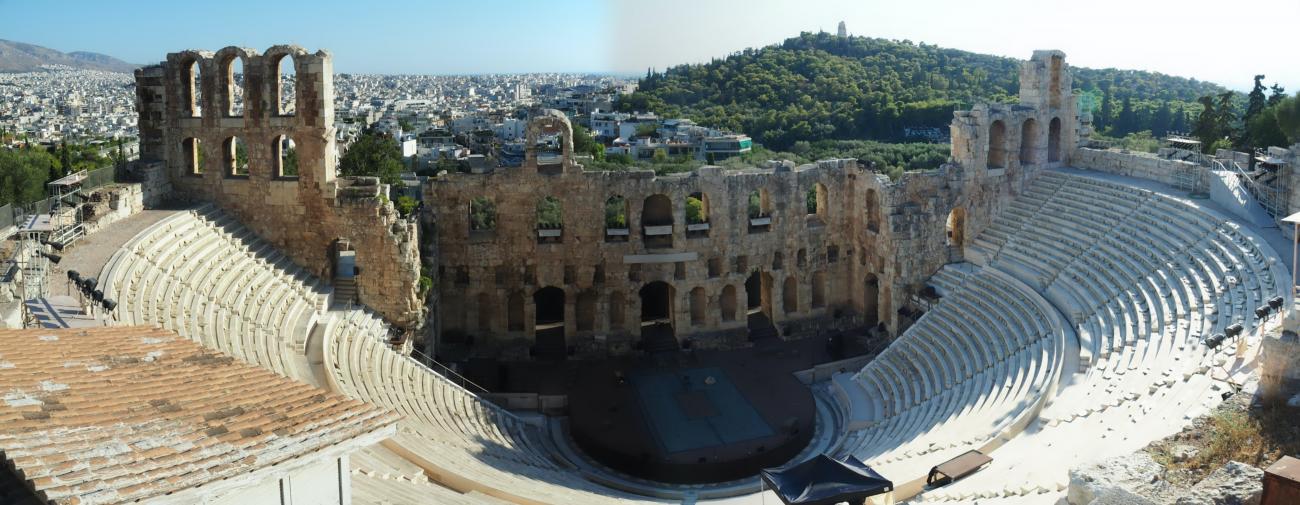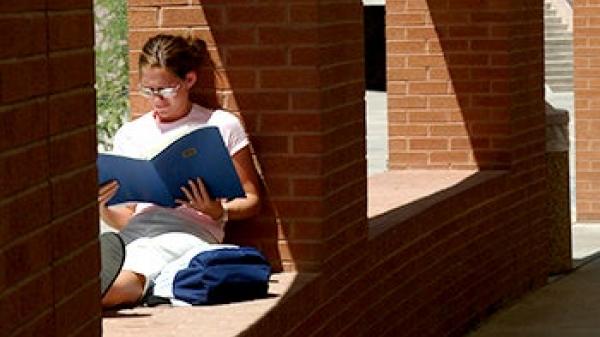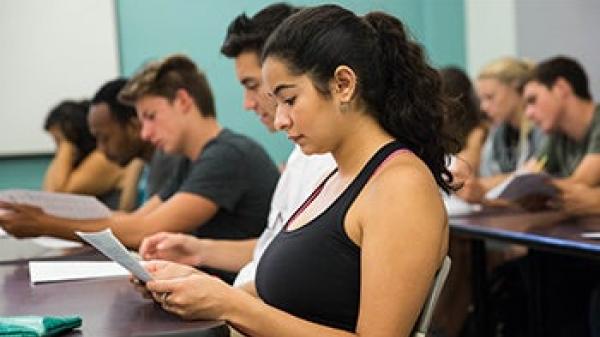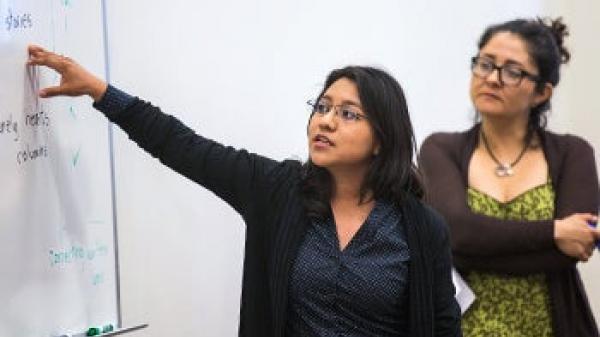Overview
What is “Classics”? When you study the Classics, you’re studying the ancient Greeks and Romans—everything about them: how they lived, what they thought and believed, what they wrote, painted, carved, and performed. You’ll work closely with faculty from a variety of fields who believe that antiquity still has many secrets to reveal, not only about our past but about our society and ourselves.
In the Classics, you will study areas such as:
- ancient history, war, politics, and economics
- literary classics such as Homer, Sophocles, Virgil, and Ovid
- the archaeology of the ancient Mediterranean world
- the art and architecture of the ancient Egyptians, Greeks, and Romans
- the mythology and religious practices of the Greeks and Romans
- the thought of figures such as Plato, Aristotle, and Lucretius
- the use of the classics in today’s film, books, and other media
Generations of students have found these topics to be highly personally satisfying and rewarding. They also have prized the individual attention that faculty give to students’ intellectual development, and the flexibility that this inherently interdisciplinary field gives to design a plan of study that reflects their interests.
But what about career prospects? These differ depending on the path a student follows. Study of the Classics at ASU proceeds along one of two paths: “Classics” and “Classical Civilization.”
Classics graduates have often found careers as:
- lawyers,
- priests, pastors,
- or high school Latin teachers,
- or have gone on to graduate school in literature, history, archaeology, or philosophy.
Classical Civilization graduates often head for
- the K–12 classroom,
- or into other careers using general humanities skills.
Even in careers where the Classics are not directly applicable, employers have come to value classically trained college graduates for the ability their studies have given them to look at an issue closely and from a variety of different perspectives. Classics is, after all, the original interdisciplinary major, the course followed by the great thinkers of the Renaissance and many of the most innovative minds of later centuries, including our own.
Both Classics and Classical Civilization are popular as concurrent majors. They make a good combination with:
- history, adding a deep past to the study of the history of Europe and Western civilization generally
- modern languages, filling in the pre-Renaissance background to literature
- archaeology, adding a focus on a specific ancient culture to the archaeological skillset
- philosophy, helping to understand where the Greeks got their philosophical ideas
- religion, giving a context (and a language) for the development of Christianity
- pre-law and related majors, honing the precision of language that law school demands
Classical principles and classical works of art and literature have been influencing you all your life. Would you like the key to see them clearly? The Classics faculty at ASU are ready for you!
Degrees
BA International Letters and Cultures (Classical Civilization)
Knowing the past gives a new perspective on the present. Once you have experienced the myths, history and culture of ancient Greece and Rome, you'll always see the big picture. The long-term thinking and distinctive viewpoint of the classical civilization graduate is prized in education, business, law and creative fields.
BA International Letters and Cultures (Classics)
Equip yourself for today's world with the knowledge that has molded world leaders for centuries: the classics. The study of ancient Greece and Rome, around which the Renaissance university was created, still provides the tools for thinking across boundaries of language, history and culture to imagine a new, innovative future.
Classical Studies (Certificate)
Scratch the surface of the modern world and you'll find antiquity: ancient Greek and Latin language, the old myths and gods, classic literature, art and thought. With a classics certificate, your degree will have additional depth and value.
Outreach Programs
Solis Diaboli (“Devils of the Sun”) is ASU’s Classics club. Anyone interested in any aspect of the classical world is welcome to join. The club schedules a number of fun activities each year, such as classical movie nights, “meet the professor” get-togethers, and a homecoming costume contest including ASU’s only historically accurate togas.
Apples and Archaeology is an outreach program of the Central Arizona chapter of the Archaeological Institute of America. They send archaeologists and other scholars of antiquity to K–12 classrooms in the Phoenix area for special presentations about the ancient world.
The Fall Forum brings high school Latin students from across Arizona to the ASU Tempe campus for a day of presentations, activities, and contests about the ancient Mediterranean world. It usually occurs in October or November. Send an email to Almira Poudrier if you’d like to participate.
People
Faculty
Alumni Stories
Name Brandon Curdie
Graduation year 2012
Major BA in European History and BS in Political Science
What's your current job?
Associate at Klauer Law, PC. I recently passed the Bar Exam and waiting to receive my bar number from the State Bar of Arizona.
How does language and culture help you succeed in your career?
I firmly believe that the time I spent studying Latin as an undergraduate student at ASU tremendously helped in law school, taking the bar, and will continue to help as I practice law. Just like translating Latin, the law and how one understands it involves great deal of reasoning and logical analysis. I was lucky enough to have great Latin professors at ASU that instructed Latin in a way that required their students to develop analytical and reasoning skills.
Studying the different cultures in my undergraduate studies also prepared me for the practice of law. On any given day, I do not know who is going to walk through the door. Being able to effectively communicate and most importantly, advocate for people with different cultural backgrounds, is vital for a successful attorney. Studying cultures that differ from mine, helped, and will continue to help my effectiveness as an attorney.
How did ASU and the language program at SILC prepare you for your future?
As a student, whether you take a course in Latin, Greek, Roman History, etc. you will inevitably spend a great deal of studying. For me, my time studying my SILC classes prepared me (more than others) for my career. You can often get through typical undergraduate courses by “cramming” the night before a big test. When studying Latin, that is not an option. You have to develop, and stick to, a routine of honing in your craft daily. Creating this kind of work habit is essential to succeeding in law school, taking the bar, and practicing law.
What was your favorite thing about learning a language?
The professors and fellow students that I met while taking Latin. I am still in contact with a number of my fellow classmates and professors. Professor Poudrier, Arena and Haberman were the most professional and helpful professors I had while at ASU.
Any advice for current language studies students?
Yes studying a different language opens opportunities for a career in teaching the language, but that is not the only option. I am an example of someone who studied a language and took from it more than just the ability to translate or teach it. I took one route, but there are many routes language students can take and use their skills they learned to further their career. Studying a different language makes you actually think; that obviously can be used for anything in everyday life.
Name Michael Bigg
Graduation year Spring 2014
Major European History; Classical Civilization
What's your current job?
Firefighter/Paramedic
How does language and culture help you succeed in your career?
I took two languages at ASU: German and Latin. Now neither are major languages in the Phoenix metro area but they have been immensely helpful in thinking logically and understanding a diverse customer base through being open to and interested in learning about other cultures. Furthermore, I just completed a year long paramedic program and having some knowledge of Latin was a great asset in learning medical terminology and physiology. There were moments I was completely lost but I'd understand what the root word in Latin meant and it would help me get on the right path.
Did you study abroad? If so, can you speak about your experience?
I did a study abroad session in 2012 for German. It was one of the best experiences of my life. It is one thing to study the language in a classroom, it is quite another when it is being spoken around you and you immerse yourself in the culture, the history and the daily life of native speakers. Simple things like ordering food become a challenge but also force you to grow more confident in your language skills.
How did ASU and the language program at SILC prepare you for your future?
I've had a lifelong love of history and learning about other cultures but learning a language takes it a step further. Once you begin to understand and think in another language it reveals another layer of a people. Many of the characteristics of a culture are reflected in their language. My second degree, Classical Civilization, went very in-depth into the history, politics and literature of the ancient Greeks and Romans and really focused on thinking critically and research. So both degrees and both languages prepared me for the future by appreciating the differences in various cultures, critical thinking and research and in my current field those are all vitally important.
What was your favorite thing about learning a language?
The people, both fellow students and instructors. I met amazing peers and the professors in both the German and Classics departments were fantastic people who really care about student success.
Any advice for current language studies students?
Get involved in the related extracurricular activities. I joined the German club and Solis Diaboli and it is a great way to meet people, get involved and they are terrific resources for tutoring/networking/study groups. Plus they are a lot of fun!










